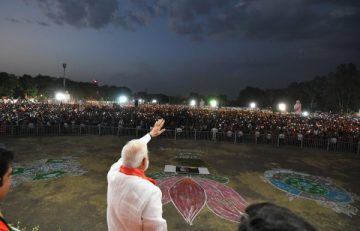Namit Arora in Himal:
 In Varanasi recently, I took an auto-rickshaw from Godowlia to Assi Ghat. Like everyone else in town, the driver and I began talking politics. The 2019 general election was a week away and Prime Minister Narendra Modi was seeking reelection from Varanasi. The driver was an ardent Modi fan and would hear no criticism of him. He even claimed that demonetisation had punished the corrupt rich. One topic led to another and soon he was loudly praising Nathuram Godse as a patriot – Gandhi deserved no less than a bullet for being a Muslim lover. “You don’t know these people,” he thundered. “Read our history! Only Muslims have killed their own fathers to become kings. Has any Hindu ever done so? Inki jaat hi aisi hai. You too should open your mobile and read on WhatsApp. Kamina Rahul is born of a Muslim and a Christian; Nehru’s grandfather, also Muslim, Mughal. Outsiders all. Modi will teach them!” Fortunately, my destination came before his passion for the topic could escalate further.
In Varanasi recently, I took an auto-rickshaw from Godowlia to Assi Ghat. Like everyone else in town, the driver and I began talking politics. The 2019 general election was a week away and Prime Minister Narendra Modi was seeking reelection from Varanasi. The driver was an ardent Modi fan and would hear no criticism of him. He even claimed that demonetisation had punished the corrupt rich. One topic led to another and soon he was loudly praising Nathuram Godse as a patriot – Gandhi deserved no less than a bullet for being a Muslim lover. “You don’t know these people,” he thundered. “Read our history! Only Muslims have killed their own fathers to become kings. Has any Hindu ever done so? Inki jaat hi aisi hai. You too should open your mobile and read on WhatsApp. Kamina Rahul is born of a Muslim and a Christian; Nehru’s grandfather, also Muslim, Mughal. Outsiders all. Modi will teach them!” Fortunately, my destination came before his passion for the topic could escalate further.
I entered Assi Ghat with a numbing sadness. Was this really Kashi, among the oldest continuously inhabited cities of the world, known for its religious pluralism and massive density of gods, creeds and houses of worship, with its long history of largely peaceful coexistence? The Kashi of the Buddha, Adi Shankara, Kabir, Ravidas and Nanak? The Kashi of shehnai maestro Bismillah Khan, who lived in its tangled gullies and regularly played during the aarti in Balaji temple, or of Hindustani vocalist Girija Devi, whose family kept mannats on Muharram? What still remains of its famed Ganga-Jamuna tehzeeb? No, I consoled myself, my auto driver was not the norm in Varanasi, but he did herald certain fundamental changes now sweeping the country.
More here.
